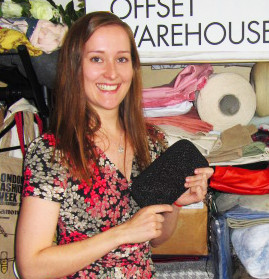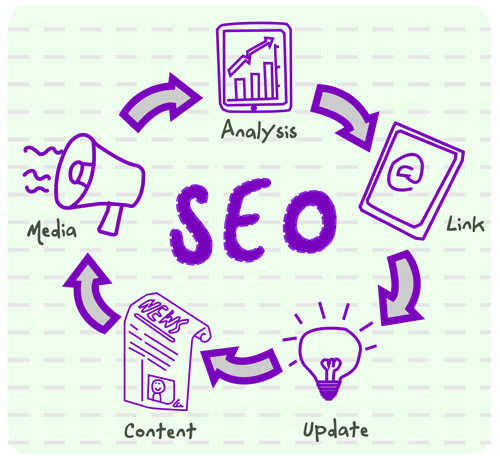
Building A Successful Online Company
Starting and operating an online company may seem daunting at first. As founder of Offset Warehouse, I've been there and know what it is like. The journey towards success is packed with challenges. "If it was easy, everyone would do it", a wise man (often) said to me. Nevertheless, it is neither too difficult, nor totally impossible.
Over the course of this incredible journey, I have learnt many important lessons on how to make an online company successful. Here are some essential things to think about before you begin.

Where to begin? Creation of the concept
To build a business, you need a product that will generate sales. This is obviously the starting point. There are millions of different types of products available on the internet. Having just another one of these is not a good start if you want to stand out. What you need instead, is a product that can fill an existing gap in the market. You need a unique product or concept.
To build a business, you need a product that will generate sales. #Online #Business

Now, here is the challenge. How do you identify a unique product that will have a big enough market?
In my case, it was from my personal experience and the trouble I faced when trying to create clothing ethically, when I realised that the world of fashion and interiors didn't have many eco-fabric options. This was how I came to develop Offset Warehouse and present an ethical product line, with every one of our fabrics defined by strong eco-credentials. Ethical customers who faced the same challenges as I did welcomed the idea whole-heartedly, and thus the company grew.
But I didn't launch my business based on blind faith with my eyes closed! I first did ample research into the market. I identified a very specific group of users and established that the number of people potentially interested in my product was big enough to be a viable business - it had potential. I took my ideas to these targeted users, to test out the water and develop a concept. Eventually, after months of planning and research, I created what is known as a "Minimum Viable Product", or MVP. Now, I feel I'm digressing a little, as this isn't exclusively related to online businesses. So in the interest of keeping this article relevant, I'll save going into detail on these methods for a future article.
Things to consider before setting up an online company

Choosing A Name
As I mentioned before, working with target users can help you figure out a concept that will appeal to them. Once you have this idea, you have to develop the product line, branding and find an appropriate, attractive name for it. Finding a memorable, relevant name, can be the hardest part of putting together a business (or take the longest time in any case)!
Before you decide on your name, Google it. Has anyone else got the same name? You need to steer clear of businesses with the same name, particularly when it comes to the "online" business. The chance of someone searching for you and finding the completely wrong business will be incredibly off-putting for customers and you'll lose credibility, loyalty and sales.
I would also recommend typing any potential names as a URL in the address bar of a browser. If someone else has the www.insert-your-name-here.com or .co.uk (etc), then I would choose another name.
Designing Your Website
Once you've chosen your name and you have a good understanding of your branding, then you can create your online store. An important point to remember when designing your web store is that it should be a reflection of your brand, be simple to understand and use, but also attractive. Study successful websites that you love yourself. Understand what sets them apart and why you favour it.
Also take the opportunity to study competitor sites. What do you like about them? What could be better? This will also help you to work out your competitive edge.
Armed with this knowledge, you can then develop your website. Once you know what you want from your online store, you can either design it yourself if you know how to do it, or entrust this task to a website designer or design company. I've written another article on marketplaces, essentially shopping platforms that you can use to host your products - they do the techie stuff and you just upload your products and show off your branding.
What makes a successful website
There are many things that contribute to the success of a company, but there are three particularly important points that make an online business successful:
- A product line that is uniquely attractive
- A website that is customer-friendly, easy to navigate and straight-forward to buy products from.
- Great marketing
We've briefly touched on points one and two. Number three is the tricky part— marketing your product.
To sell your product, people need to know about it. There are hundreds of ways that you can spread the word about your company, from press coverage, to paid advertising, to competitions, to writing blog posts on popular blogs, to sharing it with key industry contacts. Being exclusively online has one major downside - no footfall. Many online business owners launch their shops and think 'Ta-Daa' everyone will find me. WRONG. No one knows about you! How would they? Luckily there is a benefit to having an online business that a bricks-and-mortar shop doesn't have - you have one, powerful additional marketing strategy: online searches. This is where advertising and SEO come into play.
Advertising and SEO

For customers to reach you, they should first know that you exist. There are several ways to advertise yourself and build your customer base. A sensible mix of the following various approaches is what works best.
When a customer wants to purchase a product, they usually turn to a search engine like Google or Bing. Consequently, your website should be designed in such a way that it allows search engines to drive buyers your way. For this, the content should be Search Engine Optimised, shortened to 'SEO'. To simplify what this means:
The job of a search engine, like Google or Bing, is to show a searcher (or "user") the perfect page with the information they are looking for. To do this, they use search engine robots that go through each page of your website. When search engine robots have a look at your website, they'll scan the pages and store what they think is the key information. This key information is what they reference when someone does a search. The more accurate this information is, the better the results will be. We can use clever methods and tricks to suggest the key information that we want the robots to store - the key information that is relevant to the people searching for your product!
Here are a few of the "methods and tricks" that you can use to optimise the searches, or to SEO your site.
- You should have an appealing and regularly updated website, with valuable and relevant content. If you don't update your content regularly, the search engine might think that you're not active anymore and are therefore not relevant.
- Your content should be optimised with keywords that the customers you are targeting are likely to search for. If you're not using the words that you want people to find you for, how on earth do you expect to be found!?
- You post content on other websites, that link back to yours. This will not only improve your chances of getting noticed by a larger audience, but google will also notice and reward you for your engagement as it shows that you're an active user and have relevant content.
If you're not into SEO, or fancy amplifying your results, you can try using effective advertising techniques, like pay-per-click advertising to build traffic.
For more information on these steps, I would recommend a visit to the article Implementing SEO techniques for your website on the Moz Blog.
Keep it going – Social media, blogs and newsletters
Once you have completed these steps and your website is functioning as intended, you should start to see orders rolling in. However, your work is not complete. Success in an online business requires continuous effort. To grow in this domain, you should always be striving to attract more customers.
Social media networking offers opportunities for any business to grow and be noticed. Accounts on all the popular social media platforms including Facebook, Twitter, Pinterest and Instagram will help, and these should be actively updated with posts, promotions, offers and interesting information. But don't just sign up for all of them and then abandon them. Start slowly with one account, and if you have time to add more, then do so. Choose the platform that your customers will most likely be on and get going on that - in our case, we find more fashion and interior designers use Twitter, so that's our preferred platform of choice.
Creating a blog (like the one your reading right now!) is a great way to connect with your customers on a different level, sharing interesting information and guidance.
Another strategy is to offer your website visitors the option to sign up for newsletters, which will be regularly delivered to their inbox. When all these different medium are executed well, you will see traffic build up, and before long they should convert into sales.
How can you tell if you're getting it right?
With any business, it takes time to implement each element and the results are not always immediate, so how can you tell if you've got it right? For us, the most accurate and immediate way to know if we're getting it right, is by asking our customers! A lot of my time is spent talking to my customers and figuring out how I can make their fabric sourcing lives easier. Without the direct feedback from customers, I don't know what we're missing and how we can grow. Anna Bance, of Girl Meets Dress, also stresses the importance of customer feedback to help any business expand.
Many business owners are afraid to ask customers for feedback for fear of being too invasive, or fear of receiving negative criticism. But customer feedback isn't always negative! Admittedly, I'm lucky that our customers are incredibly positive and often tell us when they love a fabric, our customer service or our recent articles. You may be surprised at the number of people who tell you you're doing a great job - and that's just as valuable and jolly nice to hear!
If you're still not convinced, then online surveys might be a better option for you. Online surveys help us obtain feedback from our buyers - if you head to Offset Warehouse now, you may find an inconspicuous poll on the right hand side of the product pages. This has the scope to ask customers what they love or hate about the website or the products, and what they would like to change.
Setting up an online business is no piece of cake. It requires a continuous effort and you have to keep learning and evolving. But I believe, when you have the passion and determination to make it work, nothing can stop you from achieving your goals and establishing your brand in the online world.
If you like these articles, then please do sign up to our monthly newsletter, where I round up all the latest posts. You can tweet the article using the tweet buttons throughout the article and below.
The journey towards success is packed with challenges. #Online #Success

Success in an online business requires continuous effort. #Online #Business

